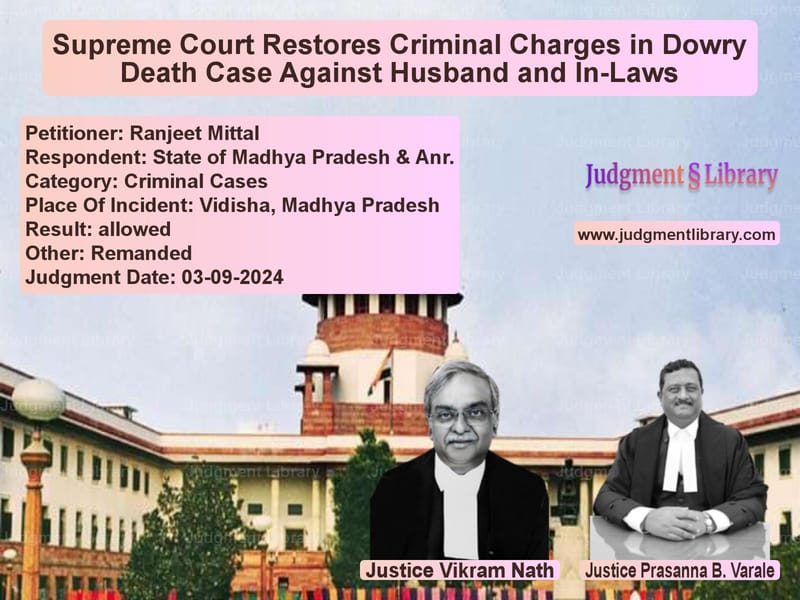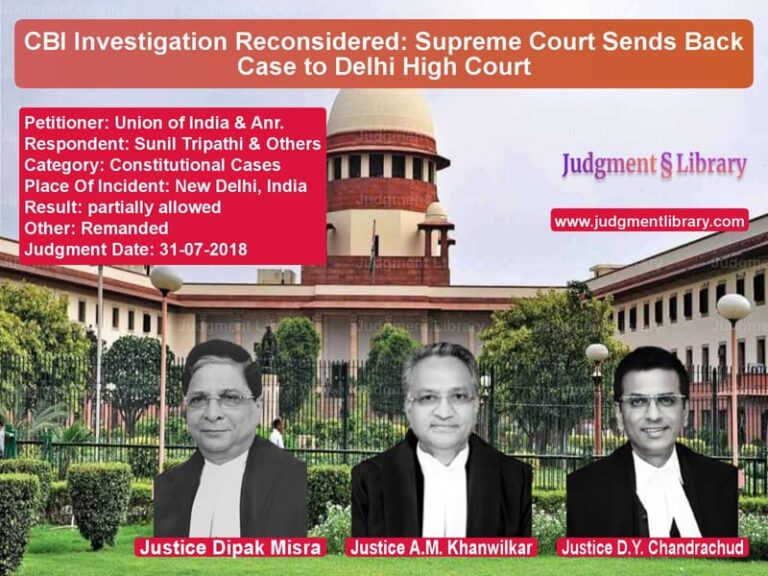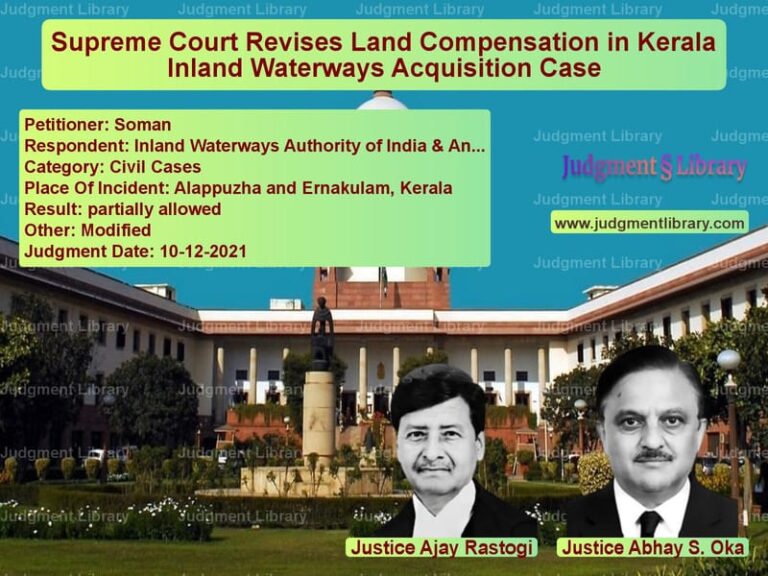Supreme Court Restores Criminal Charges in Dowry Death Case Against Husband and In-Laws
The case of Ranjeet Mittal vs. State of Madhya Pradesh & Anr. revolved around the tragic death of Anjali Agarwal, who allegedly fell from a terrace in Vidisha, Madhya Pradesh. The Supreme Court, in its judgment dated September 3, 2024, overturned the Madhya Pradesh High Court’s order that had quashed charges against the husband and in-laws, thereby reinstating criminal proceedings against them.
This case highlights key legal principles related to dowry harassment, abetment of suicide, and Section 498A of the Indian Penal Code (IPC). It also reaffirms that charges cannot be quashed when there is sufficient prima facie evidence indicating cruelty and suspicious circumstances surrounding the victim’s death.
Background of the Case
The case stems from the death of Anjali Agarwal, who was married to Sulabh Agarwal (Respondent No. 2) on May 6, 2006. They had two children, a daughter born in 2009 and a son born in 2015.
On March 10, 2018, Anjali allegedly fell from the terrace of her matrimonial home and succumbed to her injuries. A Merg (unnatural death report) was registered the same day under Section 174 CrPC based on information provided by a ward boy from the district hospital.
However, multiple testimonies and witness statements indicated that:
- Anjali was subjected to constant abuse by her in-laws due to dowry-related demands.
- She had a serious altercation with her husband an hour before her death.
- She was transported to the hospital using a handcart instead of a vehicle, raising suspicion.
- At the time of her death, she was not wearing any jewelry, suggesting possible foul play.
Legal Proceedings
Filing of FIR and Initial Investigation
- On May 17, 2018, an FIR (No. 0381/2018) was registered against the accused under Sections 498A, 306 IPC (abetment of suicide).
- Later, Sections 201 and 34 IPC (common intention) were added.
- The accused were arrested on July 22, 2018, and July 8, 2019.
- A charge sheet (No. 292/19) was filed on September 27, 2019, citing 27 witnesses.
Trial Court Frames Charges
- The Trial Court framed charges against Respondent No. 2 under Sections 498A, 306 read with Section 34 IPC and in the alternative, under Section 302 (murder) read with Section 34 IPC.
- Charges were also framed against Respondent Nos. 3 to 5 (mother-in-law, father-in-law, and sister-in-law) under Sections 498A, 306, 201, and 34 IPC.
High Court Quashes Charges
- The accused filed a Criminal Revision Petition before the Madhya Pradesh High Court under Section 397 CrPC.
- The High Court quashed all charges, ruling that:
- There was no direct evidence linking the accused to Anjali’s death.
- The case only reflected a family dispute, not abetment to suicide.
- No evidence showed instigation by the accused in the immediate period before Anjali’s death.
Appeal Before the Supreme Court
The appellant (Anjali’s brother) challenged the High Court’s decision before the Supreme Court, arguing:
- The High Court wrongly concluded that no prima facie case was made out.
- The trial court rightly framed charges based on witness statements indicating harassment and suspicious circumstances.
- The case involved serious allegations of dowry harassment and possible homicide, which required full trial examination.
Supreme Court’s Observations
The Supreme Court, comprising Justices Vikram Nath and Prasanna B. Varale, reinstated the charges and made the following observations:
1. Presence of Prima Facie Evidence
- The Court ruled that the witness statements and circumstantial evidence were sufficient to frame charges.
- It cited CBI v. Aryan Singh (2023) to emphasize that quashing charges at an early stage should be avoided when evidence exists.
2. Dowry Harassment and Abetment to Suicide
- The Court held that evidence of continuous abuse and dowry-related demands created a case for trial under Section 498A IPC.
- It stated:
“Even if no direct evidence of instigation exists, sustained harassment can contribute to abetment of suicide.”
3. Suspicious Circumstances Around Death
- The Court noted that the sequence of events raised doubts.
- Anjali was found without jewelry, was transported using a handcart, and had spoken to a witness minutes before her death.
- The Court ruled that these facts necessitated a full trial to determine culpability.
4. No Mini-Trial at Charge-Framing Stage
- The Court reaffirmed that charge-framing is a preliminary step and does not require proving guilt.
- It stated:
“At this stage, only a prima facie case needs to be established. The trial court will assess evidence during the proceedings.”
Final Judgment
The Supreme Court ruled:
- The appeal was allowed, and the High Court’s order quashing charges was set aside.
- Criminal proceedings against the accused were restored.
- The trial court was directed to proceed with the case from the stage of framing charges.
Implications of the Judgment
This ruling has significant legal implications:
- Strengthening Dowry Harassment Laws: Courts must carefully assess domestic abuse cases before dismissing charges.
- Judicial Restraint on Charge Quashing: High Courts must avoid preemptively quashing charges when prima facie evidence exists.
- Ensuring Fair Trial: The ruling allows a full trial, ensuring justice for victims of alleged dowry-related violence.
Petitioner Name: Ranjeet Mittal.Respondent Name: State of Madhya Pradesh & Anr..Judgment By: Justice Vikram Nath, Justice Prasanna B. Varale.Place Of Incident: Vidisha, Madhya Pradesh.Judgment Date: 03-09-2024.
Don’t miss out on the full details! Download the complete judgment in PDF format below and gain valuable insights instantly!
Download Judgment: ranjeet-mittal-vs-state-of-madhya-prad-supreme-court-of-india-judgment-dated-03-09-2024.pdf
Directly Download Judgment: Directly download this Judgment
See all petitions in Dowry Cases
See all petitions in Domestic Violence
See all petitions in Public Interest Litigation
See all petitions in Judgment by Vikram Nath
See all petitions in Judgment by Prasanna Bhalachandra Varale
See all petitions in allowed
See all petitions in Remanded
See all petitions in supreme court of India judgments September 2024
See all petitions in 2024 judgments
See all posts in Criminal Cases Category
See all allowed petitions in Criminal Cases Category
See all Dismissed petitions in Criminal Cases Category
See all partially allowed petitions in Criminal Cases Category







